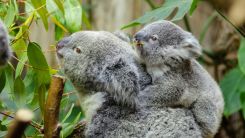
Isabella Beltran

[Watch] Sea Slug's Decapitated Head Crawls and Grows New Body in Stunning Video

Overweight and Obese Americans Make up 78% of COVID-19 Hospitalization, CDC Warns

Adverse Effects of Sugar on Your Immune System; Excessive Consumption May Cause Obesity

Humans Dominated a Majority of Freshwater Resources, Disrupting Ebb and Flow

Earth's Deoxygenation Expected in 1 Billion Years
Zero-Gravity Vegetable Garden Aboard the ISS Boosts Morale and Steady Food Supply for Astronauts

Stereolithography: 3D Printed Human Organs and Tissue Now Possible With Revolutionary Method

Elon Musk's Neuralink - Can It Make Humans Compete with AI?
Human Microbiome: Viruses That Live and Thrive Inside

Fatphobia and Body-Shaming, the X Factor in Obesity Research
Tree of Heaven Fungus: Here's How to Eradicate Invasive Species

Dance Your Ph.D. 2020 Contest Winner: Rapping Scientists Grab Award for Molecular Clusters Performance

COVID-19 Variants: How Co-Infections Could Happen in the Body
Britain's Moth Population Declined by a Third in the Past 50 Years [Study]
Anteosaurus: Prehistoric Killing Machine That Terrorized Earth Before the Dinosaurs
Neanderthals Could Hear? May Have Understood, Recognized Human Speech Like Modern-Day Man
Oldest Known Pet Cemetery in Ancient Egyptian Port With 2,000-Year-Old Remains of Cats, Dogs

Great Oxygenation Event: What Was It And How Did It Affect Life?
How Climate Change Helped Dinosaurs Migrate from South America to Greenland

Polycystic Ovary Syndrome or PCOS : 5 Myths Debunked by Science

Depression and Stomach Ulcer Link Revealed by Genetics

Healthy Pooping Habits: 5 Steps According to Science for a Better Digestive System

Over 140,000 Virus Species Found Inside the Human Gut, Mostly Unknown

Horse Deworming Drug As Do-It-Yourself COVID-19 Treatment Worry Health Experts

Koala Bears Battle With Cancer and STD Due to Genome-Altering Virus

5 Benefits of Vitamin B6 According to Science
Roopkund Skeleton Lake: Scientists Continue Research on Origin of Hundreds of Human Bones in the Himalayas

Neutrophil Activation in Blood Tests Can Predict Severe COVID-19 and Mortality, Study Says
Transatlantic Fiber Optic Cables Could Improve Earthquake Detection and Save Lives
Most Popular

How Strong Are Tornadoes? Understanding the EF Scale and the Extreme Power Tornadoes

Glaciers Are Melting Fast: Climate Change Impact Driving Sea-Level Rise Worldwide

How Telescopes Work: Optical vs Radio vs Space Telescope Science Explained

Can the World Run Out of Water? Water Scarcity Science and Climate Impact Explained




